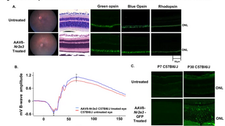LCA
Disease Category: autosomal recessive
Patient Population: <50,000
Active Clinical Trials: None at this time
Treatment Options: None known
Strategies to Preserve Eye Health: None known
Institution(s) Conducting Research: Beijing Tongren Hospital, Casey Eye Institute, Emory University, Wills Eye Hospital, Retina Foundation of the Southwest, Bascom Palmer Eye Institute, Shiley Eye Institute (UCSD), University of Illinois at Chicago, Wilmer Eye Institute (John Hopkins University), McGill University, Rotterdam Eye Hospital, Moorefield Eye Hospital, University of Tubingen
A FACE OF RP

tbd
tbd
BRIEF DESCRIPTION
Leber congenital amaurosis (LCA) is a group of inherited retinal diseases characterized by severe impaired vision or blindness at birth. LCA occurs when photoreceptors in the retina degenerate or malfunction. Photoreceptors are cells that capture light and convert it into electrical signals that the brain uses to create images. LCA causes abnormal vision in early childhood that worsens over time. Symptoms include nystagmus, poorly responsive pupils, and severe vision loss. LCA is usually inherited in an autosomal recessive pattern, meaning both parents must carry a defective gene to pass it on to their children. Each child has a 25% chance of inheriting the condition.
There is no cure for LCA, but eye care specialists can treat symptoms to improve vision. Treatments include eyeglasses and other low vision aids. LCA is the second most common inherited retinal dystrophy, accounting for about 5% of all retinal dystrophies. It's estimated to affect around 1 in 80,000 people.







































